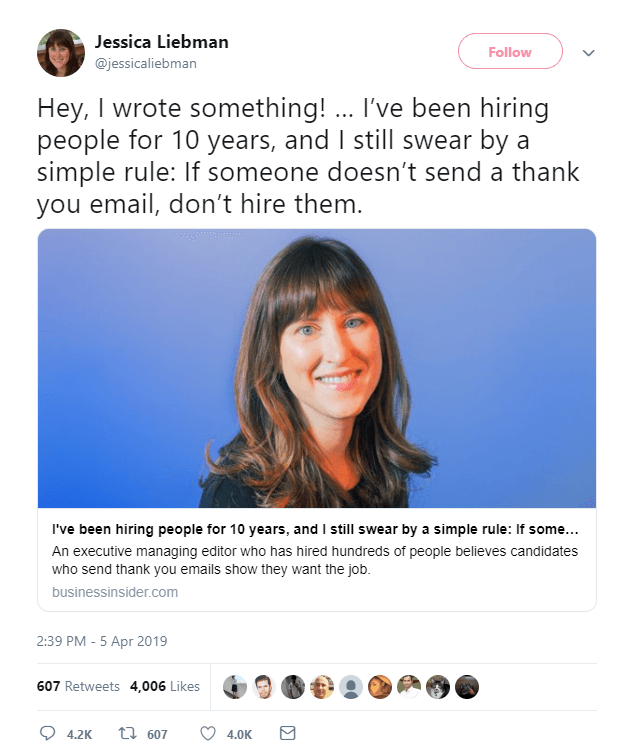If you’re on Twitter, you might have seen this tweet blow up this week:

Helping you get to where you want to be when you graduate
It’s probably safe to say that most people don’t like interviews. It’s normal. But there are ways to overcome your fears with practical steps and positive thinking.
(more…)Joe Baldwin, a Chemistry student at Bristol, shares his experience as a Commercial Banking Summer Intern at HSBC.
My time as an HSBC Intern started as I expect it does for many, concerned about possibility of not having a job to go to after graduation. My search for an internship wasn’t about finding the perfect internship, as I didn’t know what this would be. I wanted to get a flavour of the jobs available to chemists – one that doesn’t involve lab coats and safety goggles. (more…)
 June 4th sees the launch of Before You Go Week, an intensive week of events, talks and individual appointments to help you make the most of the summer months – whether you are graduating, or coming back to the University in September.
June 4th sees the launch of Before You Go Week, an intensive week of events, talks and individual appointments to help you make the most of the summer months – whether you are graduating, or coming back to the University in September.
We’d love to support as many of you as possible. Take our quiz to find out if you could benefit from coming in to see us before you go!
Alex secured a role with Selfridges as a Front End Developer after graduating in 2015 with a BSc Politics and the Bristol PLUS Award under his belt.

“The Bristol PLUS Award encouraged me to pursue hours of paid work which helped populate my CV and gave me experience of what to expect in an office. It also helped prepare me with examples that I could talk about in my interview, to help showcase various efforts I made in trying to gain employment.
or those of you who haven’t decided on what you would like to do after you graduate – don’t worry, there’s still time!
Check out what we have on at the Spring Careers Fair 2 & 3 May from 12-3pm.
 1. Careers Fair Plus App
1. Careers Fair Plus App
Download the Careers Fair Plus App from the App Store or Google Play Store. Check out which employers are attending on each day and use the filters to narrow your search. Don’t forget to let us know your thoughts once you’ve visited via the feedback form.
2. Employers
This is your chance to meet a range of companies of different sizes, and sectors, and to find out about opportunities for future graduate jobs and internships. Also, employers are still hiring; use the filter on the Careers Fair app to find out who.
3. Global Opportunities
Are you an International Student looking to secure work in the UK or back home? We’re holding a short talk on how to secure a job or work experience in the UK. This will be followed up by employer films highlighting their recruitment across the globe. Click here to sign up.
LinkedIn is ideal for building a professional network and giving prospective employers a good view of who you are and is a popular medium for recruiting people. However, have you considered your other social media pages when it comes to job hunting?
Whether you’re looking for a part-time job, internship or a graduate role, social media can have a key part to play.
The terms employers use to talk about their organisation and/or their recruitment process can be confusing. Get prepared for the autumn term employer events and your job applications with our jargon-buster.
Magic circle – Nothing to do with Harry Potter. This is the term sometimes used to describe the top 5 law firms in the UK: Allen & Overy, Clifford Chance, Freshfields Bruckhaus Deringer, Linklaters and Slaughter & May.
Silver circle – Similar to the above, a group of top law firms that do not quite rank alongside the magic circle: Herbert Smith Freehills, Ashurst, Berwin Leighton Paisner, Macfarlanes and Travers Smith.
The big 4 – These are the 4 largest professional services networks in the world: Deloitte, PricewaterhouseCoopers, Ernst & Young and KPMG. They offer audit, assurance, taxation, management consulting, advisory, actuarial, corporate finance and legal services.
SMEs – Small or medium-sized enterprises. In the European Union, these are defined as organisations that employ fewer than 250 employees and have an annual turnover of no more than 50 million euros.
Vacation scheme – This is not a holiday! A period of work experience with a law firm, usually running for 1 or 2 weeks.
Internship – These are often paid placements offered by firms who regularly recruit graduates. Most often in the summer, but there are also part-time, term-time and vacation opportunities.
Hidden jobs market – This is a term often used to describe jobs that aren’t advertised. You can tap into this by networking, making use of contacts and writing speculative applications.
Entry level job – A role that requires little prior experience in the field or profession.
Referees – These are the contacts (usually two) you put on CVs or application forms who can be contacted by an employer to verify the information you have provided or to give insight into your personality. The referee should know you well enough to be able to write positively about you.
Transferrable skills – Also known as ‘soft skills’ or ‘portable skills’, these are skills used in one job or career that can also be used in another, rather than relying on direct experience of the industry. For example, leadership, organisation and communication skills.
DOE – Think it’s a female deer? Think again! Abbreviation for ‘dependent on experience’. An employer will offer a salary within a given range but is willing to pay more for a candidate with more experience.
OTE – Abbreviation for on-target earnings. This is an estimate of actual earnings where pay is made up of both base salary and a variable bonus/commission. Particularly found in job descriptions for sales roles.
Graduate scheme – A structured programme for recent graduates that includes work and training. It can last up to 3 years, though some are much shorter. Completing the scheme successfully often secures a professional qualification as well as a permanent role in the organisation.
Psychometric test – Any activity and assessment that is conducted in order to evaluate candidate performance, including intelligence, skills and personality.
Assessment centre – Usually a day or half day at an employer’s office or training venue involving a combination of tasks and activities to find the right candidates. Involves working in groups and includes a variety of exercises such as role play, in-tray exercises and presentations.
Competency-based interview – This is an interview where situational or behavioural questions are asked. They aim to find out how you have used specific skills in your previous experience and how you approach problems, tasks and challenges.
Strengths-based interview – Type of interview style becoming increasingly popular amongst graduate recruiters. It aims to find out what you enjoy doing and hence what engages you the most.
If you would like more information about some of these terms or support with finding and applying for opportunities, visit the careers service website or contact us directly.
 Landing your dream job can feel like the stuff of fantasy, but it doesn’t have to if you take the right approach.
Landing your dream job can feel like the stuff of fantasy, but it doesn’t have to if you take the right approach.
As an ex-lawyer turned career coach with experience in property, PR, teaching and copywriting, I know all too well how important finding the right job is and the frustrations of being in a role which doesn’t quite fit.
I also know how much you’ve invested in your studies, the time you spend thinking about your career and that fulfilment can hinge on more than a pay cheque.
So here are my top tips for securing a job which ticks all the boxes:
Knowing who you are and what you want is essential to positive change. Before considering what kind of company or organization you’d like to work for, ask yourself what gives your life purpose and meaning, in and outside work. Your values might range from money, work-life balance and family to meeting new people, travel or having fun.
If you’re unsure what drives you, ask yourself what you couldn’t do without in a dream day, what you’re doing when you’re happiest or what you’d love to be paid for. If you’re still struggling, ask yourself what you really dislike and turn this on its head. For example, if it’s working long hours with little time to socialize, it may be that work-life balance is top of your list.
Once you know what drives you, focus on organizations which meet these needs and maximize your chances of fulfilment.
If you’ve got into the University of Bristol, chances are you’ve got strong analytical and critical thinking skills – the perfect combination for identifying your dream job! The most fulfilled people are resourceful in harnessing their strengths, helping them narrow down their ideal workplace, prepare for interview and seal the deal.
If you’re struggling to find the time or perspective to research what kind of organization appeals, reach out to one of our career advisors. They’ll help you move from where you are now to where you want to be. Our applications advisor will also have top tips for how to craft a winning CV, covering letter or application form.
Whether you’re a rising star or a Mensa child, intellectual skill and charm are no substitute for interview preparation. The most common pitfalls are being unable to communicate what an organization does, why this appeals and how your experience and skillset set you apart.
Avoid this by thoroughly reading the organization’s website, articles published by key stakeholders and talking to any contacts you may have. Then identify questions you could be asked and practise your answers with a trusted friend or one of our careers advisors. Ensure you tailor your answers to the skills and experience required in the job and person specification. And if you’re asked a competency based question (tell me a time when…), structure your answer around the STAR acronym – check out this handy video for tips.
Finally, be sure to show-off commercial awareness by reading up on market and organizational developments.
You can read all you want around the firm but there’s no substitute for face to face gut feeling. If you have a good gut feeling, trust it. If not, ask yourself which of your core values aren’t being met and if this is a deal-breaker. Good luck!
What happens at a Careers Service Interview Skills event?
As part of Selection Perfection fortnight we ran a variety of sessions covering the different stages of the selection process.
One of the most popular sessions was an Interview Skills workshop run by Ed Bootle from True Clarity. This workshop covered the essential preparation for interviews that students should be doing (but are so often overlooked), and looked at how to answer the interview questions you are dreading!
What did the students think of the session?
“As a mature student at Bristol, I have already attended several daunting job and university interviews. However, I am always completely intimidated and overwhelmed at the prospect of another one! Ed Bootle’s interview skills workshop was one of the most practical and honest sessions I have attended at university. Coming directly from the interviewer’s mouth, Ed gave us a real insight into how interviews are designed to work, what the interviewer is expecting from you, and what you can do to make the best impression possible. Too often we take for granted the simple things, such as standing up when shaking hands or ensuring that you have robust questions to ask at the end of your interview. The workshop was candid and easy-going, and I feel as though everybody walked away from it feeling much more confident about themselves and their next big interview.”
Sarah Muston (2nd year BA Anthropology)
Lee gives us an insight into some of the topics that were covered in the session:
“The session was delivered by an experienced interviewer so it was great to get a feel for the interview process from an expert. I found the section on which questions are good to ask and those that are not so good to ask in an interview interesting. We did a group activity on how to approach awkward questions, the key thing that I took away from that activity was to be mindful of why certain questions are being asked. I didn’t quite appreciate the importance of a job specification, but as the speaker clearly pointed out – the job specification is a very useful tool to tailor your interview preparation around. I would highly recommend this session to anyone who wants to learn how to deliver an effective interview.”
Lee Clay (2nd year BSc Childhood Studies with Quantitative Research Methods)
How to get help preparing for interview
Preparation and practice are key! If you would like help with preparing for interviews, please take a look at the interview section on our website, as well as our interview simulator on mycareer which is an online video interviewing module enabling you to practise answering questions and perfecting your technique. We will be running more interview skills events throughout the rest of the academic year. You can keep up to date with all our events through mycareer.
One final note from us:
“The key to a good interview is preparation and understanding what the interviewer is asking and why.”
Good luck!